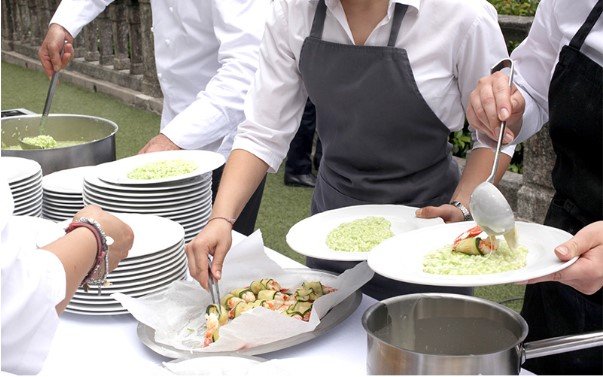Food waste is a hidden yet critical issue within Singapore’s catering industry. Every year, local catering services generate tonnes of uneaten food at corporate parties, weddings, and private functions, much of which ends up in landfills. With rising public awareness about sustainability and the region’s push to reduce food waste by 30% by 2030, caterers are rethinking their operations. It’s no longer enough for catering services in Singapore to focus solely on menu variety and presentation—there’s a growing demand for sustainable practices that minimise surplus, repurpose leftovers, and divert waste from landfills.
Examine how local catering services are reducing food waste while balancing company aims and client expectations.
Ways Local Catering Services Reduce Food Waste
Forecasting Demand to Minimise Surplus
Local catering services rely heavily on accurate demand forecasting to prevent overproduction. Menu planning, guest profiling, and understanding the nature of the event are key factors that determine how much food needs to be prepared. Many caterers employ event management software and historical data analysis to estimate food quantities precisely. By collaborating closely with clients, especially for events with fluctuating headcounts, caterers can adjust menus or service formats—such as switching from full buffets to plated meals—to control portioning. This proactive approach helps reduce the risk of excess food being prepared and subsequently wasted.
Portion Control and Menu Engineering
Effective portion control is another strategy that local catering leverages to tackle food waste. Caterers carefully consider the portion size of each dish to balance customer satisfaction and sustainability goals. In many cases, buffet-style catering, while popular, leads to higher waste levels as guests tend to over-serve themselves. Local catering services may introduce smaller serving trays, re-design buffet layouts to limit overloading, or assign staff to manage portions at serving stations to counter this. Additionally, menu engineering—designing menus prioritising dishes with lower waste potential or versatile ingredients—has gained traction. For example, using surplus ingredients from one dish as components for another can significantly cut down wastage.
ALSO READ: How to Plan the Perfect Mini Party Catering Menu
Redistribution and Donation Efforts
Local catering services are increasingly turning to redistribution programmes when surplus food is unavoidable. Organisations such as Food from the Heart and The Food Bank Singapore facilitate partnerships between caterers and food charities, enabling the safe collection and redistribution of unserved food to communities in need. Caterers who participate in these schemes must comply with strict food safety standards, including proper handling and storage of food before redistribution. This system ensures that edible excess of catering in Singapore does not go to waste, aligning with corporate social responsibility goals while contributing to a more circular food economy.
Waste Segregation and Composting Initiatives
Waste segregation and composting for food that is no longer suitable for consumption have become key practices among environmentally conscious catering services. By separating organic waste from other waste streams, caterers can facilitate composting efforts either in-house or through partnerships with local composting facilities. Some larger catering operations even invest in on-site food waste digesters that break down organic material into compost or liquid fertiliser. These efforts help divert food waste from landfills, reducing the carbon footprint of catering services.
Ongoing Challenges in Sustainable Catering
Despite these efforts, challenges persist in managing food waste within the city-state’s catering industry. Events with unpredictable guest turnout, cultural expectations of abundance at celebrations, and stringent food safety regulations can sometimes make it difficult to fully eliminate waste. However, local catering is evolving, with many companies recognising that sustainability is no longer optional but a core expectation. Local catering services are taking meaningful steps to reduce food waste and operate more responsibly by adopting technology, rethinking service models, and collaborating with food redistribution networks.
Selecting a catering service in Singapore that prioritises sustainability can significantly support event organisers and clients. Remember to ask your caterer about their food waste policies, portion methods, and donation partnerships when planning an event. After all, every step towards waste reduction contributes to a more sustainable future.
Visit Elsie’s Kitchen and explore catering options that minimise waste while maximising impact for your next event.

